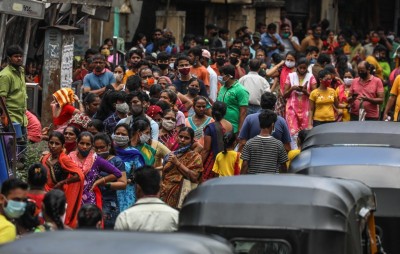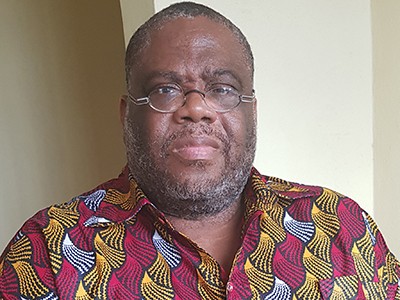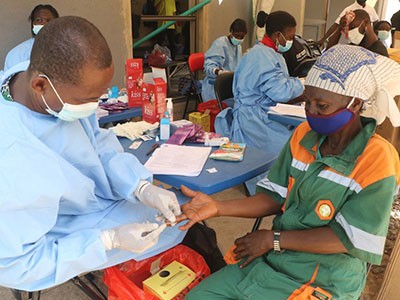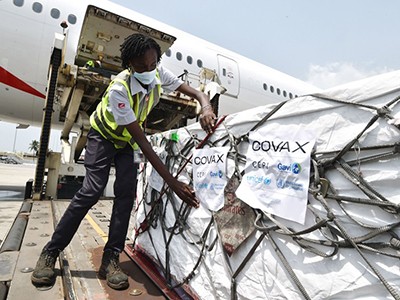
[ad_1]
For greater than a 12 months, Adeola Fowotade struggled to recruit folks to a medical trial for COVID-19 remedies. A medical virologist at College Faculty Hospital in Ibadan, Nigeria, she joined the trouble in August 2020, which goals to check the efficacy of a mix of available medication. Her aim was to seek out 50 volunteers — folks identified with COVID-19 who had average to extreme signs and may profit from the drug cocktail. However the recruitment effort crawled alongside, whilst instances of the virus surged in Nigeria in January and February. After 8 months, she had managed to enlist solely 44 folks.
“Some sufferers declined to take part within the research when approached, whereas some who agreed discontinued halfway into the trials,” says Fowotade. As soon as case charges began to say no in March, it grew to become almost unimaginable to seek out individuals. This made the trial, referred to as NACOVID, tough to finish. “We have been unable to satisfy our deliberate pattern measurement,” she says. The trial led to September, in need of its recruitment aim.
Fowotade’s troubles mirror these confronted by different trials in Africa — posing a significant drawback for these nations within the continent which have been unable to safe sufficient vaccines in opposition to COVID-19. Solely 2.7% of individuals in Nigeria, the continent’s most populous nation, have been at the least partially vaccinated. That’s simply barely decrease than the typical fee for low-income nations. Estimates counsel that it may take till at the least September 2022 for African nations to acquire sufficient doses to completely vaccinate 70% of the continent’s inhabitants.
That leaves few choices for preventing the pandemic now. Though rich nations outdoors Africa have used remedies reminiscent of monoclonal antibodies or the antiviral drug remdesivir, these have to be administered in hospitals and are costly. The drug large Merck has agreed to license its pill-based drug molnupiravir to producers that would supply broad entry to the drug, however questions stay about how expensive it is going to be if it does get approval. So the hunt is on for inexpensive, available medication for Africa that might scale back COVID-19 signs, decrease the burden of illness on health-care techniques and scale back deaths.
How COVID spurred Africa to plot a vaccines revolution
That search has confronted quite a few hurdles. In response to the US-run database clinicaltrials.gov, of almost 2,000 trials at the moment exploring drug remedies for COVID-19, solely about 150 are registered in Africa, and the overwhelming majority of these are in Egypt and South Africa. The dearth of trials is problematic, says Adeniyi Olagunju, a medical pharmacologist on the College of Liverpool, UK, and the principal investigator for NACOVID. If Africa is basically lacking from COVID-19 remedy trials, then the chance of it accessing medication that get authorized may be very restricted, he says. “Add that to the abysmally low entry to vaccines,” Olagunju says. “Africa wants efficient therapeutics for COVID-19 as an choice greater than every other continent.”
Some organizations are attempting to treatment this shortfall. ANTICOV, a programme coordinated by the non-profit Medicine for Uncared for Ailments initiative (DNDi), is at the moment the most important trial in Africa. It’s testing early remedy choices for COVID-19 in two trial arms. One other research referred to as Repurposing Anti-Infectives for COVID-19 Remedy (ReACT) — coordinated by the non-profit basis Medicines for Malaria Enterprise — will check the security and efficacy of repurposed medication in South Africa. However regulatory challenges, an absence of infrastructure and difficulties with recruiting trial individuals all current main hurdles to such efforts.
“We’ve a damaged health-care system in sub-Saharan Africa,” says Samba Sow, the nationwide principal investigator for ANTICOV in Mali. That makes the trials laborious however all of the extra crucial, significantly for figuring out medication that may assist folks throughout the earliest phases of illness and stop hospitalizations. For him and plenty of others engaged on the illness, it’s a race in opposition to loss of life. “We will’t wait till sufferers grow to be severely ailing,” he says.
Trials on the up
The coronavirus pandemic has given medical analysis within the African continent a lift. Vaccinologist Duduzile Ndwandwe tracks analysis on experimental remedies at Cochrane South Africa — a part of the worldwide group that evaluations well being proof — and says that the Pan African Medical Trials Registry registered a complete of 606 medical trials in 2020, in contrast with 408 in 2019 (see ‘Medical trials in Africa’). By August this 12 months, it had registered 271, together with trials for each vaccines and medicines. “We’ve seen a number of trials increasing with COVID-19,” Ndwandwe says.
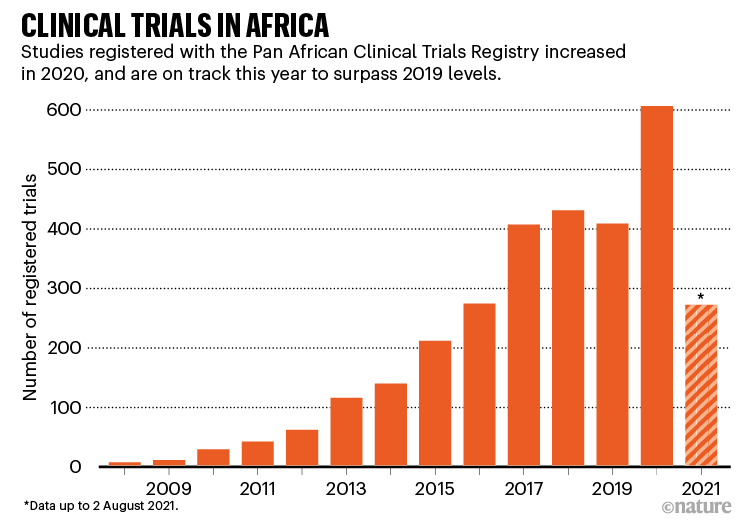
Supply: https://pactr.samrc.ac.za
Trials for coronavirus remedies are nonetheless missing, nevertheless. In March 2020, the World Well being Group (WHO) launched its flagship Solidarity trial, a world research of 4 potential COVID-19 remedies. Solely two African nations participated within the first part of the research. Challenges in offering health-care providers for severely ailing sufferers precluded most nations from becoming a member of, says Quarraisha Abdool Karim, a medical epidemiologist at Columbia College in New York Metropolis who is predicated in Durban, South Africa. “It was an necessary missed alternative,” she says, nevertheless it laid the groundwork for extra COVID-19 remedy trials. In August, the WHO introduced the subsequent part of the Solidarity trial, which is able to check three different medication. 5 extra African nations are taking part.
The NACOVID trial that Fowotade labored on aimed to check its mixture remedy on 98 folks in Ibadan and three different websites in Nigeria. Individuals in that research got the antiretrovirals atazanavir and ritonavir, and an antiparasitic drug referred to as nitazoxanide. Regardless that it didn’t meet its recruitment aim, Olagunju says that the groups concerned are getting ready a manuscript for publication and are hopeful that the information will present some perception concerning the medication’ effectiveness.
The struggle to fabricate COVID vaccines in lower-income nations
South Africa’s ReACT trial, sponsored by the South Korean drug firm Shin Poong Pharmaceutical in Seoul, goals to check 4 repurposed drug combos: the antimalarial therapies artesunate–amodiaquine and pyronaridine–artesunate; the influenza antiviral favipiravir, given with nitazoxanide; and sofosbuvir and daclatasvir, an antiviral mixture sometimes used to deal with hepatitis C.
Utilizing repurposed medication is extremely engaging to many researchers, as a result of it could possibly be probably the most viable path to quickly discovering remedies that may be distributed simply. Africa’s lack of infrastructure for pharmaceutical analysis, improvement and manufacturing signifies that nations can’t readily check new compounds and mass-produce medication. Such efforts are essential, says Nadia Sam-Agudu, a specialist in paediatric infectious ailments on the College of Maryland in Baltimore, who works on the Institute of Human Virology Nigeria in Abuja. “If efficient, these remedies could forestall extreme illness and hospitalization, in addition to doubtlessly [stop] onward transmission,” she provides.
The continent’s largest trial, ANTICOV, was launched in September 2020 within the hope that early remedies may forestall COVID-19 from overwhelming the delicate health-care techniques in Africa. It has at the moment enrolled greater than 500 individuals throughout 14 websites within the Democratic Republic of the Congo, Burkina Faso, Guinea, Mali, Ghana, Kenya and Mozambique. It goals to finally recruit 3,000 individuals throughout 13 nations.
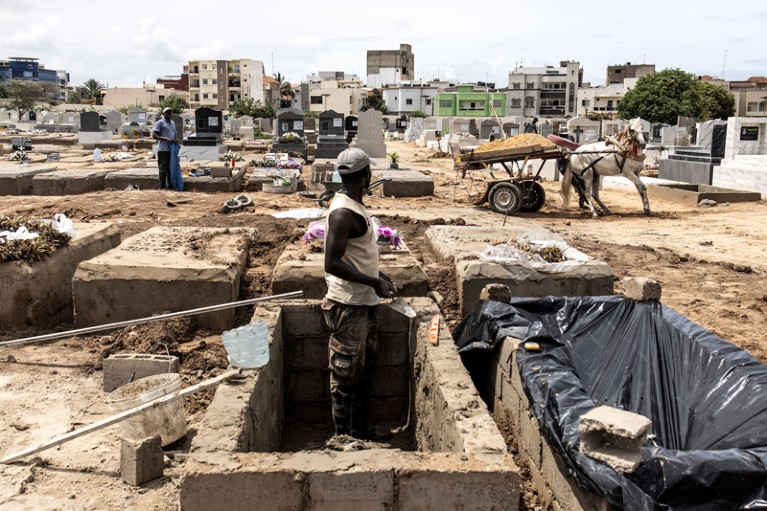
A employee in a cemetery in Dakar, Senegal, in August as a 3rd wave of COVID-19 infections hit.Credit score: John Wessels/AFP/Getty
ANTICOV is testing the efficacy of two mixture remedies which have seen blended outcomes elsewhere. The primary blends nitazoxanide with inhaled ciclesonide, a corticosteroid used to deal with bronchial asthma. The second combines artesunate–amodiaquine with the antiparasitic drug ivermectin.
Ivermectin, which is utilized in veterinary drugs and to deal with some uncared for tropical ailments in people, has grow to be controversial in lots of nations. People and politicians have been demanding entry to it for the remedy of COVID-19 on the idea of anecdotal and scant scientific proof about its efficacy. A number of the knowledge supporting its use are questionable. A big research in Egypt that supported administering ivermectin in folks with COVID-19 was withdrawn by the preprint server the place it was revealed amid accusations of information irregularities and plagiarism. (The authors of the research have argued they weren’t given a chance by the publishers to defend themselves.) A current systematic assessment by the Cochrane Infectious Illness Group discovered no proof to help ivermectin’s use for treating COVID-19 infections (M. Popp et al. Cochrane Database Syst. Rev. 7, CD015017; 2021).
Keep in mind Ebola: cease mass COVID deaths in Africa
Nathalie Strub-Wourgaft, who heads the DNDi’s COVID-19 actions, says there are authentic causes to check the drug in Africa. She and her colleagues are hopeful that it would act as an anti-inflammatory when given alongside the antimalaria medication. And the DNDi is poised to check different medication if this mixture is discovered missing.
“The difficulty of ivermectin has been politicized,” says epidemiologist Salim Abdool Karim, director of the Centre for the AIDS Programme of Analysis in South Africa (CAPRISA), headquartered in Durban. “But when the trials in Africa may also help resolve that or make an necessary contribution, then that’s a good suggestion.”
Strub-Wourgaft says that the mix of nitazoxanide and ciclesonide appears to be like promising on the idea of current knowledge thus far. “We’ve encouraging preclinical and medical knowledge that supported our choice for this mixture,” she says. After an interim evaluation final September, Strub-Wourgaft says ANTICOV is getting ready to check a brand new arm, and can proceed with the 2 current remedy arms.
Boundaries and bottlenecks
Getting the trials began was a problem, even for the DNDi, which has a number of expertise working within the continent. Regulatory approvals offered a significant bottleneck, says Strub-Wourgaft. So, ANTICOV collaborated with the WHO’s African Vaccine Regulatory Discussion board (AVAREF) to arrange an emergency course of for joint evaluations of medical research in 13 nations. This might velocity up regulatory and moral approvals. “It permits us to carry nations, regulators and ethics-review-committee members collectively,” says Strub-Wourgaft.
Nick White, a specialist in tropical drugs who chairs the COVID-19 Medical Analysis Coalition, a world collaboration to seek out options to COVID-19 in low-income nations, says that though the WHO initiative is nice, it nonetheless takes longer to acquire approvals for research in low- and middle-income nations than it does in rich ones. The explanations embody strict regulatory regimes in these nations, and authorities which are unskilled at navigating moral and regulatory assessment. That is one thing that has to alter, says White. “If nations wish to discover the options to COVID-19, they need to assist their researchers to do the required analysis, not impede them.”
However the challenges don’t cease there. Fowotade says that logistics and insufficient electrical provides can stall progress as soon as a trial begins. She was storing COVID-19 samples in a −20 °C freezer on the hospital in Ibadan when it skilled energy outages. She additionally wanted to move the samples to a centre in Ede for evaluation, a two-hour drive away. “I typically really feel apprehensive concerning the integrity of the saved samples,” Fowotade says.
How COVID is derailing the struggle in opposition to HIV, TB and malaria
Olagunju provides that recruiting trial individuals grew to become much more tough when some states stopped funding COVID-19 isolation centres of their hospitals. With out these sources, solely sufferers who may afford to pay have been admitted. “We deliberate and began our trial based mostly on the data that the federal government was accountable for funding isolation and remedy centres. No one anticipated that to be interrupted,” says Olagunju.
And though it’s typically effectively resourced, Nigeria is notably not a participant in ANTICOV. “Everyone avoids Nigeria to do medical trials as a result of we aren’t organized,” says Oyewale Tomori, a virologist and chair of Nigeria’s Ministerial Knowledgeable Advisory Committee on COVID-19, which works to determine efficient methods and greatest practices for responding to COVID-19.
Babatunde Salako, director-general of the Nigerian Institute of Medical Analysis in Lagos, disagrees with that view. Salako says that Nigeria has the data to conduct medical trials in addition to hospitals for recruitment and a vibrant ethics-review committee, which coordinates approvals for medical trials in Nigeria. “When it comes to infrastructure, sure, it might be weak; it could actually nonetheless help medical trials,” he says.
Ndwandwe needs to encourage extra African researchers to hitch medical trials in order that its residents can have equitable entry to promising therapies. Native trials may also help researchers to determine pragmatic remedies. They usually can deal with the precise wants of low-resource settings and contribute to higher well being outcomes, says Hellen Mnjalla, a clinical-trials supervisor on the Kenya Medical Analysis Institute–Wellcome Belief Analysis Programme in Kilifi.
“COVID-19 is a brand new infectious illness, so we have to do medical trials to know how these interventions are going to work on African populations,” provides Ndwandwe.
Salim Abdool Karim hopes that the disaster will spur African scientists to construct on a number of the analysis infrastructure that had been set as much as struggle the HIV/AIDS epidemic. “The infrastructure is effectively developed in some nations like Kenya, Uganda and South Africa. But it surely’s much less developed in others,” he says.
To bolster medical trials for COVID-19 remedies in Africa, Salim Abdool Karim suggests establishing a physique such because the Consortium for COVID-19 Vaccine Medical Trials (CONCVACT; created in July 2020 by the Africa Centres for Illness Management and Prevention) to coordinate remedy trials on the continent. The African Union — the continental physique representing the 55 African member states — is effectively positioned to take that accountability. “They’re already doing it for vaccines, in order that could possibly be prolonged for remedies too,” says Salim Abdool Karim.
The COVID-19 pandemic, says Sow, will be overcome solely by means of worldwide collaboration and equitable partnerships. “Within the international struggle in opposition to infectious ailments, a rustic can by no means go alone — not even a continent can,” he says.
[ad_2]
Supply hyperlink

